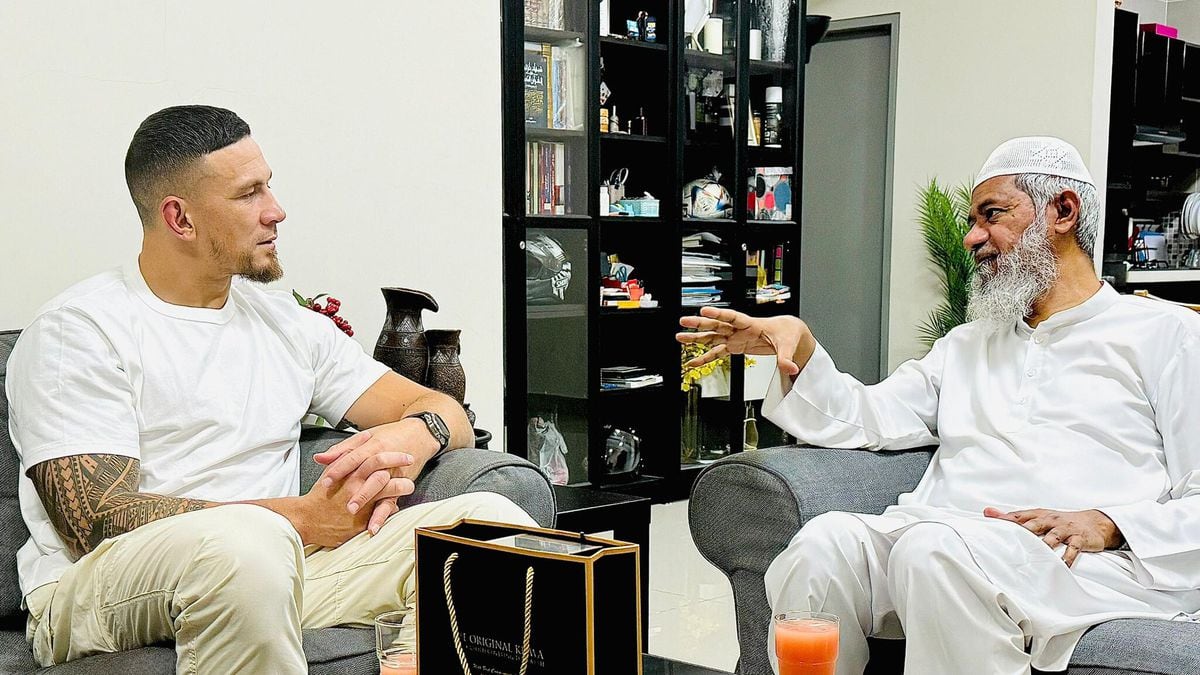Sonny Bill Williams during his meeting with Dr Zakir Naik, a controversial Muslim cleric, in Malaysia in mid-February. Photo / Supplied
Sonny Bill Williams has had a one-on-one audience with a controversial Muslim cleric who is banned from the UK amid allegations from former British Prime Ministers David Cameron and Theresa May that he preached hate.
The code-hopping former sports star – who has sparked controversy with his views in the wake of the Hamas terror attack on Israel, and Israel’s response – returned to Australia this week after a trip to Malaysia.
While in the Southeast-Asian nation, the convert to Islam in 2009 spent time at a Muslim religious convention, shared prayers at local mosques, held a religious knowledge-sharing talk and also took a rugby coaching clinic.
One of his appointments was also with controversial Muslim cleric Dr Zakir Naik, a man wanted by authorities in his native India and who is banned from entering the UK and whose TV network is also banned from being broadcast in England and several other nations.
Sunni and Shia clerics in India have also called for a ban on his TV channel, books and online speeches. Some of the latter were said to have inspired terrorists who carried out a deadly attack in Bangladesh in 2016.
After the pair met on February 19, Williams posted social media photos of the pair, with the caption: “Mashaallah it was an honour to finally meet you sheikh.”
Mashaallah translates in English to “God has willed it”.
Naik also posted photos of the meeting with the caption: “Interaction with Muslim Sportsmen Sonny Bill Williams World Renowned New Zealand Heavyweight Boxer and former Professional Rugby League and Rugby Union Player who reverted to Islaam in 2009.”
Williams did not respond to a Herald request – passed on to him by his manager, Khoder Nasser – for comment on his trip to Malaysia and his one on one with Naik.
/cloudfront-ap-southeast-2.images.arcpublishing.com/nzme/ZG43DGS2XZAKDKS2RYLZUQ7JRQ.jpg)
He told local reporters before leaving the country: “I must admit the beauty of Malaysians. I am proud, as a Muslim, when I saw many people come to perform Subuh prayers.”
Naik also didn’t respond to the Herald.
/cloudfront-ap-southeast-2.images.arcpublishing.com/nzme/DA544HASTVCBFLJFCSSQCY5TYU.jpg)
He has 28 million followers on social media and his Peace TV is broadcast to an estimated 200 countries. The network states that by “promoting Islam and removing misconceptions about Islam” it promotes “truth, justice, morality, harmony and wisdom”.
But his earlier words were taken as anything but peaceful, saying in a 1996 speech discussing Osama bin Laden that “every Muslim should be a terrorist”, describing America as the “biggest terrorist” and then adding “I am with him”.
After the 9/11 terror attacks carried out in 2001 by bin Laden’s terror group, he claimed they were actually an “inside job”.
The comments later contributed to Naik being banned from the UK by Therese May in 2010, who was then British Home Secretary.
Shortly before he was to travel to England for a series of engagements, May wrote to him stating she had “decided to exclude you from the UK for engaging in unacceptable behaviour by making statements that attempt to justify terrorist activity and fostering hatred”.
Cameron described him as a “hate preacher”, while future PM May told the media “numerous comments made by Dr Naik are evidence to me of his unacceptable behaviour”.
Naik sought legal action to overthrow the ban, a bid which was later thrown out by the High Court. He had argued he was against terrorism and he had been misrepresented.
Cameron also named Naik during a speech to Israel’s parliament in 2014 highlighting how his government had “excluded more foreign preachers of hate on the basis of our strategy for preventing extremism than ever before”.
Naik founded Peace TV in the same year he was banned from the UK.
/cloudfront-ap-southeast-2.images.arcpublishing.com/nzme/B36ASF32SZSVAHEZKPU6YG3N2E.jpg)
The network – which has been broadcast out of Dubai – has run afoul in several countries.
As well as being banned in England, India’s Intelligence Bureau raised concern about some content for what was deemed “malicious and anti-national” content.
Also in India, both Shia and Sunni clerics have hit out at his content and messaging.
It was also taken off air in Sri Lanka after organisers of the 2019 deadly Easter bombings in Colombo praised him.
In the wake of those attacks – which killed 269 and injured more than 500 others – Indian Prime Minister Narendra Modi claimed “Zakir Naik’s words have caused blasts in Sri Lanka”.
He also took aim at supporters who called him “an apostle of peace”.
Indian authorities have been seeking Naik’s return to India for several years to answer charges of alleged money laundering and hate speech.
/cloudfront-ap-southeast-2.images.arcpublishing.com/nzme/DHTA3F53PS3DC64SEM2R43MWFY.jpg)
Other stances taken by Naik include the potential for capital punishment for those who leave Islam, describing members of the LGBTQI community as having a “sinful mental problem” and how thieves should have a hand chopped off.
New Zealand Islamic official: Controversial cleric may be victim of slurs
Vice president of the Federation of Islamic Associations of New Zealand (FIANZ) Dr Mohammed Rizwan said while he had not listened to any of Naik’s podcasts or watched his videos, he had heard of the preacher.
From what he knew, he said Naik was “quite knowledgeable” about not just Islam, but other religions as well.
/cloudfront-ap-southeast-2.images.arcpublishing.com/nzme/M7QDYTFKEFDHHFQW23KLRKI2QI.jpg)
He also said from what he knew of him, he didn’t believe he was someone who promoted extremism.
“In terms of being accused of promoting terrorism, I think that is something that is not true in regards to him,” Rizwan said.
“All he does is Dawah [inviting or calling people to the religion of Islam] work and educating people about Islam, not terrorism.
/cloudfront-ap-southeast-2.images.arcpublishing.com/nzme/U34CVFWXOVBUZNRTGQFNOXNXV4.jpg)
“He is someone who I believe others are threatened of him and make up stories about him.”
He understood Naik had been “banned” from India as his work had seen many Hindus turn to Islam.
“The Hindu government did not like that and wanted to prosecute him so he had to run away from India,” Rizwan said.
The FIANZ executive member said Williams was probably doing what many others who converted from Christianity to Islam did, in seeking to gain wider views of people within the religion and increase their education.
“Sonny Bill Williams wasn’t born a Muslim,” he said. “He is someone who converted to Islam . . . most people who do tend to seek out scholars and people who are more educated in their religion, and try to spend some time and learn from that.”
Williams opened up about his journey to becoming a Muslim during a range of interviews after the release of his autobiography in 2021.
That includes telling Te Ao with Moana that while he had had some “pretty hearty conversations” with teammates who were Christian, there were no issues.
/cloudfront-ap-southeast-2.images.arcpublishing.com/nzme/7YYOAJIZ6ZFTLIMV635MPCDHW4.jpg)
Williams said the path to becoming Muslim had taken some time.
“When it came to the mental health struggles that I was having at that time, I’ve always believed in God. So for myself, I knew I needed God and, when I went down that religious path, I studied, I studied, I studied and it brought me to Islam.”
Neil Reid is a Napier-based senior reporter who covers general news, features and sport. He joined the Herald in 2014 and has 30 years of newsroom experience.




 Zany Zeus halloumi cheese recalled: Nausea, vomiting, diarrhoea-causing bacteria may be present
Zany Zeus halloumi cheese recalled: Nausea, vomiting, diarrhoea-causing bacteria may be present